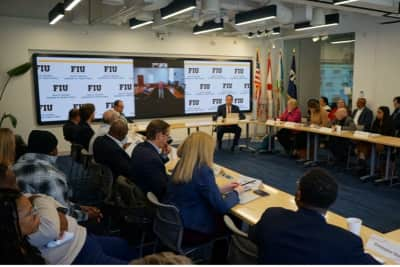
Celebrating the 11th Annual Hemispheric Security Conference
Join us in Miami, gateway to the Americas, Tuesday, May 5 - Thursday, May 7, 2026, for one of the leading security forums in the Western Hemisphere. The HSC is FIU and Miami's flagship security event, advancing high-level dialogue, collaboration and actionable solutions on issues at the intersection of security, governannce, and economic development.

JGI Policy Pulse Podcast
Join us as we explore a wide range of international challenges and opportunities that will shape the 21st century. In each episode, you’ll meet foreign policy experts, hear insightful discussions, and be a part of thought-provoking conversations driving global change. Stay informed and engaged with JGI Policy Pulse, where policy is at the heart of all our discussions.
Upcoming Events
For Media Inquiries
Reach out to Irene Ferradaz at iferrada@fiu.edu









